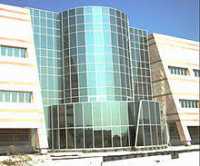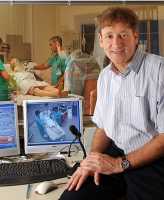
03 Apr Sheba Medical Center in Israel Providing Care for Coronavirus Patients and Education of Providers
MedicalResearch.com Interview with:
Prof. Amitai Ziv, MD, MHA
Deputy Director of Sheba Medical Center
Founder and Director, The Israel Center for Medical Simulation
MedicalResearch.com: Would you briefly describe the mission/history of Sheba Medical Center?
Response: Born together with Israel in 1948, Sheba Medical Center, Tel HaShomer is the largest and most comprehensive medical center in the Middle East. Sheba is the only medical center in Israel that combines an acute care hospital and a rehabilitation hospital on one campus, and it is at the forefront of medical treatments, patient care, research and education. As a university teaching hospital affiliated with the Sackler School of Medicine at Tel-Aviv University, it welcomes people from all over the world indiscriminately. For the past two years (2019 and 2020), Newsweek Magazine has named Sheba one of the top ten hospitals in the world.
MSR, the Israel Center for Medical Simulation at Sheba Medical Center, is the country’s only national multi-modality, interdisciplinary simulation center. Through MSR’s training courses, which can include sophisticated robotics, surgical simulators and role-playing actors, healthcare providers effectively improve their clinical and communication skills, creating a safer, more ethical, patient-centered culture of treatment.
MedicalResearch.com: Are there specific challenges unique to treating COVID-19?
Response: COVID-19 poses a set of unique challenges to healthcare providers. There are changes in the way clinical procedures are conducted, as extra protective measures are required.
There is also a critical need to establish more ICU units dedicated to severely ill coronavirus patients in need of respiratory support, and train additional staff to care for these patients.
Additionally, communication between the physician and the patient become more important than ever, given the barriers that protective gear raise and the fear and anxiety around the disease. Telemedicine has become a major feature in treating coronavirus. Conducting medical rounds via distance technologies and establishing trust and conveying compassionate care through screens are new territories for many healthcare workers.
MedicalResearch.com: What steps or programs has Sheba Medical Center taken to educate and train health care providers specifically to fight this pandemic? Who has or will have access to this training initiative?
Response: At the request of Israel’s Ministry of Health, MSR has led the charge in preparing medical professionals for handling the complexities of coronavirus. In addition to conducting licensing exams for 160 ICU nurses, MSR has continued to conduct mandatory workshops for interns to hone their emergency medical skills and ready them for immediate and effective entry into the field.
Furthermore, the Ministry asked MSR to prepare a national simulation-based training program on the management of coronavirus patients in intensive care – the number of which are unfortunately expected to grow. And as the need for additional support arises, MSR has offered its services to train medical students, biotechnologists and others as they are recruited to be support staff in Israel’s hospitals.
MSR is also producing multiple instructional videos outlining important steps in the management of such patients, as well as in the infectious control aspects, to protect the healthcare staff who are at major risk. These videos will be public domain for Israel’s healthcare system and hospital teams. In addition, MSR is extending its hand to the Palestinian Authority and a hospital in East Jerusalem by offering them on-site and distance training as needed. Sheba’s MSR courses have set the standard for the country.
The critical courses developed by MSR pertaining to coronavirus include:
- Development of protocols for donning protective suits and resuscitation
- Training teams to use ventilators and perform other critical clinical tasks with protective gear – a crucial issue due to a lack of trained nurses in this area
- Communication skills and protocol for delivering the news about a positive diagnosis, including simulation-based training for social workers and psychologists working with patients’ families
- Training social workers, psychiatrists and psychologists to provide treatment via telemedicine
- Clinical training for handling psychiatric patients who have tested positive
Looking forward, MSR is actively working on courses to train healthcare professionals on dealing with end-of-life scenarios in which screen technology is the only medium available to say goodbye to loved ones.
MedicalResearch.com: Is there anything else you would like to add?
Response: Because Sheba was the first hospital in Israel to take on the national responsibility of caring for coronavirus patients, MSR has been instrumental from day one in improving the readiness of medical teams for the unknown scenarios ahead. Many of the initial protocols for handling coronavirus in Israel were written out Sheba while testing various procedures at MSR, which contributed handily to improving the effectiveness of care and safety of patients.
[subscribe]
[last-modified]
The information on MedicalResearch.com is provided for educational purposes only, and is in no way intended to diagnose, cure, or treat any medical or other condition. Always seek the advice of your physician or other qualified health and ask your doctor any questions you may have regarding a medical condition. In addition to all other limitations and disclaimers in this agreement, service provider and its third party providers disclaim any liability or loss in connection with the content provided on this website.
Last Updated on April 3, 2020 by Marie Benz MD FAAD

